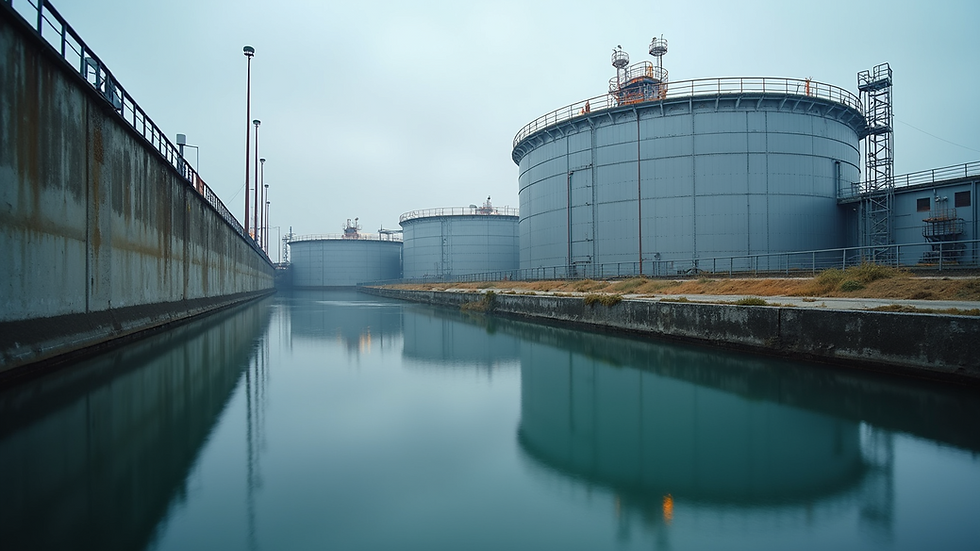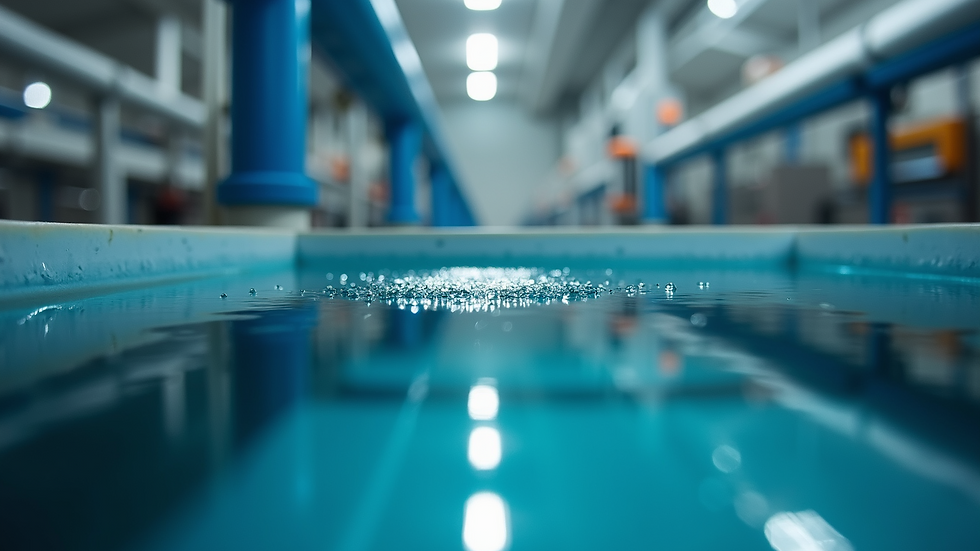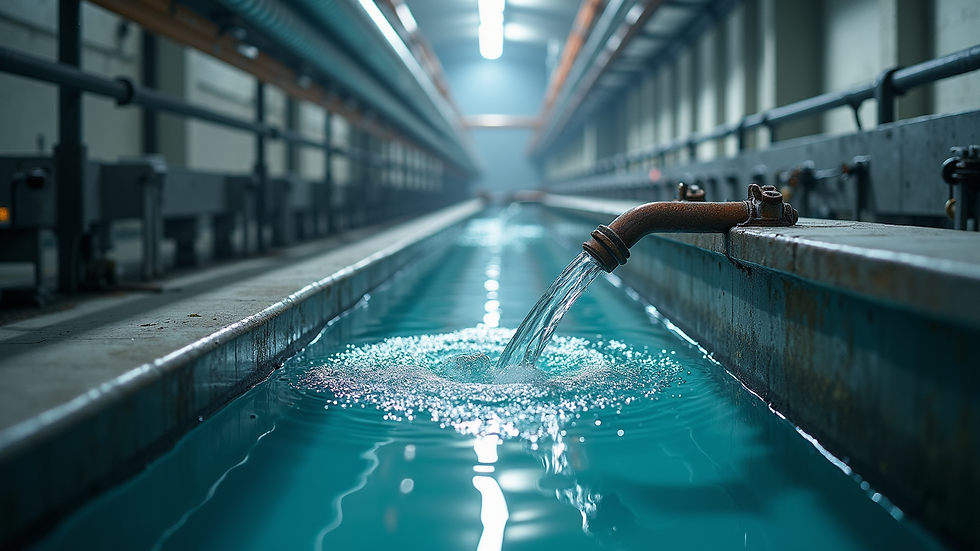Understanding Industrial Wastewater Management in India
- palwinder kaur
- Aug 30, 2025
- 4 min read
Industrial growth in India has been rapid over the past few decades. While this growth has boosted the economy, it has also led to significant environmental challenges. One of the most pressing issues is the management of wastewater generated by industries. Proper treatment and disposal of industrial wastewater are crucial to protect water bodies, public health, and the environment. This article explores the various wastewater treatment methods used in India, the importance of industrial wastewater management, and practical steps industries can take to improve their water management practices.
The Importance of Wastewater Treatment Methods in India
India's industrial sector produces a large volume of wastewater daily. This wastewater often contains harmful chemicals, heavy metals, and organic pollutants that can severely impact the environment if not treated properly. Wastewater treatment methods are essential to reduce pollution and ensure that water released back into the environment meets safety standards.
Some key reasons why wastewater treatment is vital in India include:
Protecting Water Resources: India faces water scarcity in many regions. Treating and reusing wastewater helps conserve freshwater resources.
Preventing Health Hazards: Untreated industrial wastewater can contaminate drinking water sources, leading to diseases.
Complying with Regulations: The Indian government has strict laws regarding wastewater discharge. Industries must comply to avoid penalties.
Sustaining Ecosystems: Proper treatment prevents damage to aquatic life and maintains biodiversity.
Industries in sectors such as textiles, chemicals, pharmaceuticals, and food processing are among the largest contributors to industrial wastewater. Each sector requires tailored treatment methods to address specific pollutants.

Common Wastewater Treatment Methods Used in Indian Industries
Several wastewater treatment methods are employed across Indian industries, depending on the type and volume of wastewater generated. These methods can be broadly categorized into physical, chemical, and biological treatments.
1. Physical Treatment
Physical treatment involves the removal of suspended solids and large particles from wastewater. Common techniques include:
Screening: Removes large debris like plastics and rags.
Sedimentation: Allows heavy particles to settle at the bottom of tanks.
Filtration: Uses sand or other media to filter out smaller particles.
Physical treatment is usually the first step before chemical or biological processes.
2. Chemical Treatment
Chemical treatment uses chemicals to neutralize or remove pollutants. Techniques include:
Coagulation and Flocculation: Chemicals are added to clump fine particles into larger ones for easier removal.
Neutralization: Adjusts the pH of acidic or alkaline wastewater to safe levels.
Oxidation: Breaks down organic pollutants using oxidizing agents.
Chemical treatment is effective for industries producing wastewater with high chemical content.
3. Biological Treatment
Biological treatment uses microorganisms to break down organic matter in wastewater. It is widely used due to its cost-effectiveness and efficiency. Common methods include:
Activated Sludge Process: Aerobic bacteria consume organic pollutants in aeration tanks.
Trickling Filters: Wastewater passes over a bed of media where bacteria grow and degrade pollutants.
Anaerobic Digestion: Microorganisms break down organic matter in the absence of oxygen, producing biogas.
Biological treatment is suitable for industries like food processing and pharmaceuticals.
4. Advanced Treatment Methods
For industries with highly toxic or complex wastewater, advanced treatment methods may be necessary:
Membrane Filtration: Uses membranes to separate contaminants at a microscopic level.
Electrochemical Treatment: Uses electric current to remove pollutants.
Adsorption: Activated carbon or other materials absorb contaminants.
These methods are often used as tertiary treatment to polish wastewater before discharge or reuse.

What is Industrial Water Management?
Industrial water management refers to the strategies and processes industries use to optimize water use, minimize wastewater generation, and ensure safe treatment and disposal. It encompasses water sourcing, consumption, wastewater treatment, and reuse.
Effective industrial water management involves:
Water Audits: Assessing water use and identifying areas for reduction.
Process Optimization: Modifying industrial processes to reduce water consumption.
Wastewater Segregation: Separating different types of wastewater for targeted treatment.
Reuse and Recycling: Treating wastewater to a quality suitable for reuse within the industry.
Compliance Monitoring: Regularly checking treatment systems and discharge quality.
By adopting these practices, industries can reduce their environmental footprint and operational costs.
Benefits of Industrial Water Management
Cost Savings: Reduced water consumption and wastewater treatment costs.
Regulatory Compliance: Avoiding fines and legal issues.
Sustainability: Contributing to environmental conservation.
Improved Public Image: Demonstrating corporate responsibility.

Challenges in Industrial Wastewater Management in India
Despite the availability of various treatment methods, industrial wastewater management in India faces several challenges:
Lack of Awareness: Many small and medium industries are unaware of proper treatment technologies.
High Costs: Advanced treatment systems require significant investment.
Inadequate Infrastructure: Many industrial areas lack centralized treatment facilities.
Regulatory Enforcement: Weak enforcement leads to non-compliance.
Pollution Load: High variability in wastewater composition complicates treatment.
Addressing these challenges requires coordinated efforts from industries, government agencies, and technology providers.
Practical Recommendations for Improving Industrial Wastewater Management
Industries looking to improve their wastewater management can consider the following actionable steps:
Conduct Regular Water Audits: Identify water use patterns and potential savings.
Invest in Appropriate Treatment Technologies: Choose methods suited to the specific wastewater characteristics.
Implement Wastewater Segregation: Separate hazardous and non-hazardous wastewater streams.
Promote Water Reuse: Use treated wastewater for non-potable purposes like cooling or irrigation.
Train Staff: Ensure employees understand the importance of wastewater management.
Collaborate with Experts: Work with environmental consultants and technology providers.
Stay Updated on Regulations: Keep abreast of changes in environmental laws.
By following these recommendations, industries can enhance their environmental performance and contribute to sustainable development.
The Future of Industrial Wastewater Management in India
India is moving towards stricter environmental regulations and greater emphasis on sustainability. The future of industrial wastewater management will likely involve:
Increased Adoption of Advanced Technologies: Such as membrane bioreactors and zero liquid discharge systems.
Digital Monitoring: Using sensors and IoT for real-time wastewater quality monitoring.
Government Incentives: Encouraging industries to invest in green technologies.
Public-Private Partnerships: Developing centralized treatment facilities.
Greater Focus on Circular Economy: Maximizing water reuse and resource recovery.
Industries that proactively adopt these trends will be better positioned to meet future challenges.
For industries seeking reliable solutions, exploring industrial wastewater management services can provide access to expert guidance and state-of-the-art treatment technologies.
Understanding and implementing effective wastewater treatment methods is essential for India's industrial sector to grow sustainably. By adopting best practices and innovative technologies, industries can protect the environment, comply with regulations, and reduce costs. The journey towards responsible industrial water management is ongoing, but with concerted effort, it can lead to a cleaner and healthier future for all.



Comments